6. Logista and
people
6. Logista and
people
HR Roadmap
Our model is structured in a human resources plan (HR roadmap) based on 4 main pillars:
- maximum alignment with business
- pragmatism
- imminent and medium-/long-term needs
- clear, simple and inheritable
Anyone who joins the human resources department has direct access to the roadmap and is therefore able to immediately carry on the work of executing the plan based on the status of each project, thus ensuring maximum efficiency.
We work closely with general and corporate management to jointly establish our strategy and the HR roadmap. Regularly monitored using the KPIs from our scorecard, allowing us to act with certainty when making predictions and decisions that are key to the success of our strategy.
Achieving our plan therefore relies on maximum levels of coordination between the company’s divisions, human resources and the centres of excellence.
At Logista, we structure and formulate our policies based on the employee life cycle, from attracting and onboarding new talent, to their training and development, differentiation, and the process of building commitment to Logista.
We also take into account the different stages of an employee’s personal life, with flexible policies able to respond to their needs at each stage of life.
The adaptation of our policies to this diversity, which encompasses not only gender but also generational diversity, different abilities as well as situational diversity depending on the personal stage of each group, is what undoubtedly enriches us as a company and generates added value.
Ensuring the health, safety and well-being of our employees; achieving excellence in talent management throughout the process of employee attraction, development, differentiation and commitment-building, with a special focus on the integration of acquired companies, and actively contributing to society through a social initiative strategy focused on helping vulnerable groups, are the main priorities of our human resources strategy.
At Logista, people and their diversity are at the heart of our strategy.
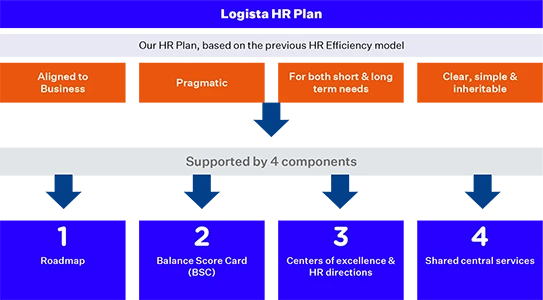
Logista’s total workforce stands at 7,601 employees1, with more than 70 different nationalities represented among its employees. In 2023, there was a workforce of 7,445 employees, with more than 50 nationalities.
Focused on excellence, its staff works daily to serve its clients in the most efficient way, always catering for their specific needs and conscious of the ways in which people and society are constantly changing.
1 Excluding 4 employees from China
Employees per country

Nationalities of employees

Permanent and temporary employees

Employees per gender

Talent and diversity
At Logista, achieving excellence in the talent management is key to the success of our business, both now and in the future.
Driven by both organic and inorganic growth, Logista is pursuing a strategy of significant expansion, acquiring and integrating companies that allow us to diversify more in terms of the regions and sectors that we operate in. The integration of new companies and their talent is undoubtedly a priority for Logista.
Talent management is therefore currently crucial in order to ensure that we remain as competitive as possible both now and in the future
This involves identifying critical roles across all our businesses (131 in total) and measuring the talent of the employees that hold these roles (talent density), allowing us to put in place all the necessary plans to achieve talent density which at the end of 2024 stands at 93%.
Short and medium-term successors are also identified for each of these critical roles, ensuring succession plans are optimally managed.
To this end, the company’s critical roles, as well as the action plans for achieving our talent target, are regularly reviewed.
In 2024, 189 potential successors for the company’s critical positions have been identified.
Diversity
At Logista, we strongly believe that diversity of all kinds greatly enriches our businesses, bringing both social value and a broader perspective that undoubtedly stimulates the company’s own evolution.
The companies within Spain with legal obligation to have an equality plan have one in force registered with the competent labor authorities for each case (Carbó Collbatallé is in the process of updating the equality plan), with the exception of the company Logista Retail, S.A.U., where the registration of the equality plan agreed with the legal representation of the workers is requested and is pending its registration by the competent labour authority, and the companies Logista Strator, S.A.U. and Transportes El Mosca in which the negotiations of their respective equality plans are open.
Measures are also being developed to achieve effective equality between men and women at work, in selection and recruitment processes, training, professional promotion and in working conditions, to facilitate the reconciliation of work and family life.
Logista now features on the Bloomberg Gender Equality Index, ranking above average for companies in our sector.
We have been recognised for the fourth year in a row as one of the European companies leading the way in diversity, after being included on the Diversity Leaders 2024,list, an international benchmark index produced by the prestigious international media outlet the Financial Times and Statista.

In Spain, our inclusion programmes have earned us recognition as a Diversity Leading Company for two consecutive years by the specialist HR publication Equipos y Talento.

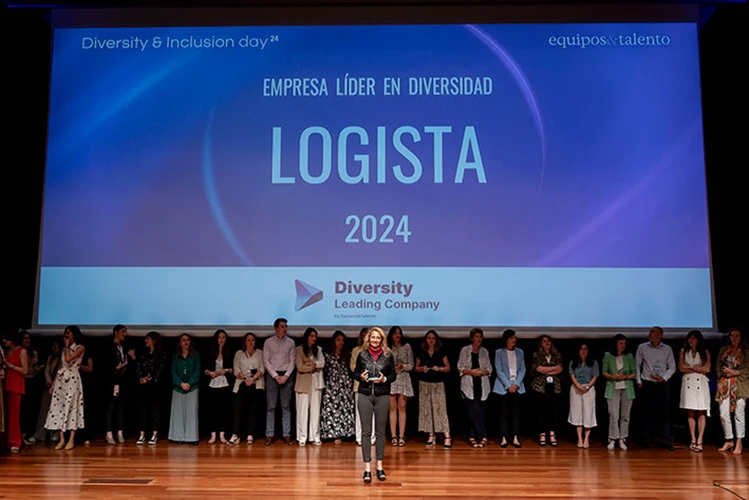
We are included in the IBEX Gender Equality Index, an index made up of the listed companies that have a ratio of between 25% and 75% of women on their boards of directors and between 15% and 85% employed in management positions.
At Logista, the ratio of women currently on the Board of Directors is 50% while the ratio of women on the management committee is 33%.
In 2023, we had a presence of 42% women on the board and 33% on the management committee.
The lines of action currently in place to ensure equality and diversity at Logista are underpinned by the following specific initiatives:
- Ensuring that 50% of the finalist candidates in each recruitment process are women.
- A requirement that 50% of new hires in upper and middle management be women has been added to our core targets.
- Creating specific plans that guarantee professional development opportunities for female talent as part of the company’s succession plan.
We have been a member of the Empowering Women Talent programme for two years in association with the company Equipo y Talento. The programme offers mentoring sessions to strengthen and develop competencies for women wishing to grow professionally and opt for senior management posts in the company.

- Training of our managers and directors to lead people in an inclusive environment.
- Analysing remuneration from a gender perspective to prevent any form of gender gap.
Generational diversity is another of our strategy’s guiding principles.
Developing junior talent, by hiring and cultivating the skills of talented young people, is the base on which our future success is founded.
One of the company’s main initiatives in terms of human capital management, the “Youners” project, plays a very important role. Its aim is to ensure that the youngest employees enrolled on this programme work their way up to managerial roles or positions that require taking on greater responsibility within Logista, thereby strengthening succession plans and guaranteeing business continuity in the future. The aim of the project is not just to attract talent, but also create loyalty – something that goes to the heart of everything we do, both internally and in our relationships with our clients.
This year has seen 42 people join the “Youners” project and gain real first-hand experience with the company’s managers at regional and divisional level. The aim is to learn how the top management of a company such as Logista works, and how it reacts to different real-life situations. There are a total of 115 people on the programme, including those Youners carrying on from last year.
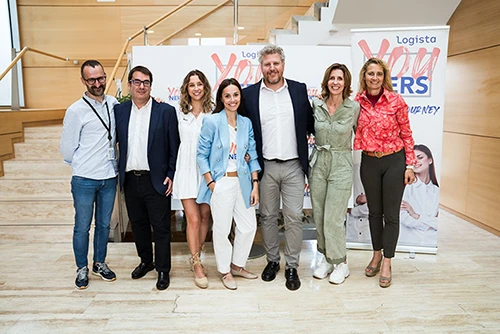
+70% of promotions in the Youners group that ends this year the 24-month program.
Thanks to this project, we have been able to implement individually prepared professional development plans, to ensure that these employees have the preparation they need to take on the responsibilities required in the positions identified as critical for the business. The aim of this is to prepare for the company’s future by laying the groundwork today, and in doing so help secure our future succession plans.
Continuing to develop Logista’s senior talent is critical to ensuring the success of our strategy.
In addition to personalised approaches, Logista has also introduced a programme for executives in collaboration with Accenture, taught at the consulting firm’s innovation hubs in Spain and Italy.
Furthermore, Logista is teaching a leadership program for executives at the IESE Business School that is developed in different modules during the year (with 18 participants).
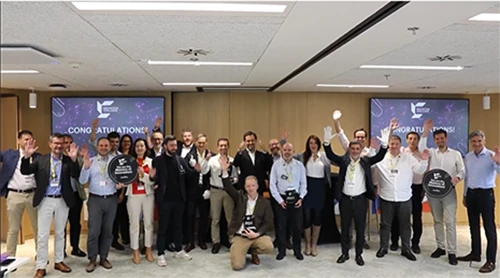
Employees with different abilities
In light of Logista’s firm commitment to equality and working with people of all abilities, the company has strengthened its agreements with a number of associations in order to help it increase the number of differently abled people it hires. In 2024, 226 people with disabilities worked for the company, up 16% on the previous year (195 people with disabilities in 2023).
Logista’s facilities and work centres are accessible, with for example, the- addition of universally accessible WCs, access ramps and specific parking spaces, among others.
During 2024
195 people with disabilities in 2023 (+16%)
Training and development
Logista is firmly committed to the ongoing training and development of all its employees. There is a direct correlation between our company’s success and the growth and development of our teams.
Our training model is based on the Three Es: Experience (70%), Exposure (20%) and Education (10%).
Training is offered both online and in-person. We are continuing to optimise the online training platform, where employees can choose from a wide range of courses and training options based on their needs and chosen career path. This tool provides employees with the flexibility to learn at their own pace and adapt their training according to their needs at each stage of their career.
Experience and exposure are the other two key pillars of our training model. As part of our day-to-day operations, Logista proactively encourages the regular assignment of its employees to important projects in its other divisions, both nationally and internationally, while also promoting mobility and internal promotion, thus allowing our teams to develop highly valued expertise and skills.
Training hours per professional category
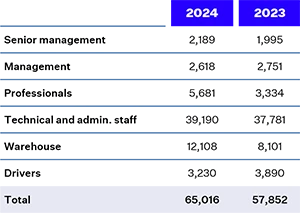
Training hours per gender

Logista ensures that its employees have all the tools and support they need to grow and reach their full professional potential.
In the 2024, financial year, 65,016 hours of training2 have been carried out (57,852 hours in 2023), corresponding to +11% more than the previous year.
This year, people from more than 45 different nationalities and 4 continents (Europe, America, Africa and Asia) have been trained.
Training hours
per age

Training hours per nationality
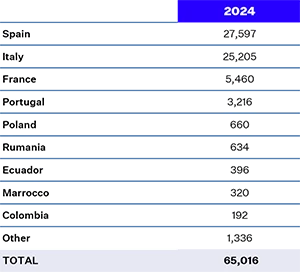
Training hours per type of training
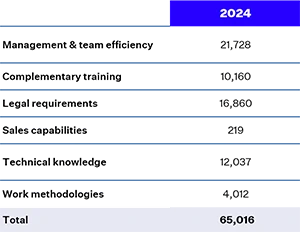
2 The breakdown of training hours by gender, age, nationality and type for the year 2023 is not included since this information was not reported in that year and the data is not available at the time of preparation of this report.
Remuneration policy
At Logista, we have been working to develop a total remuneration model based on fair pay that aims to offer our professionals a competitive and attractive package.
The key characteristics of this remuneration model include a fixed annual salary, short- and long-term variable remuneration, remuneration in kind and a whole host of benefits (pension plans, private medical insurance, life insurance and insurance for people with disabilities, among others) that are tailored to the local context of each business and country.
As in previous years, in 2024, we have been working on increasing employee commitment and engagement by tying their short- and long-term variable remuneration to the company’s annual (short-term) and strategic (long-term) objectives, including those with implications for sustainability (the environment, safety, diversity, talent, etc.).
Annual goals
1
Reduce work-related accidents
2
“Talent density”
3
Succession plans
4
Increase the number of women occupying leadership and management roles
5
Reduce the gender pay gap
6
Promotions for Youners
7
Environmental objective of reducing the emissions of our dedicated fleet
At Logista, we firmly believe in continuously developing our professionals’ performance, and we therefore ensure that our remuneration packages allow us to directly associate the highest levels of performance with the highest remuneration rate under our variable remuneration policy.
Our remuneration policy is a key part of our strategy for attracting and retaining staff, which uses objective factors, such as an individual’s position and duties, and their merit and performance, to determine appropriate and competitive levels of remuneration. The system we employ for this uses an objective method for evaluating positions that is in line with industry standards, with the emphasis always being on eliminating discrimination on the grounds of gender, age, origin, sexual orientation, religion and race.
Worthy of mention within our total remuneration model are the various flexible remuneration initiatives launched in Spain and Italy, which allow employees to choose the way in which they receive part of their pay and thus take advantage of significant tax advantages. One such initiative is Plan 12mil, which allows employees to receive remuneration in the form of shares. This not only minimises their tax burden, but also makes them a shareholder of the company, meaning that they receive a dividend.
The Logista+ platform, introduced in 2023, will soon be rolled out to France and Portugal, offering our employees a range of great benefits, including discounts on purchases and travel, while also allowing them to actively participate in our community through the events posted there.
Finally, it is worth noting the additional employee benefits offered by our health and well-being plans — more detail on these is provided in the section on occupational health.
We are still working on measuring, tracking and analysing potential gender pay gaps in each of our divisions and countries. This year we were also able to automate the process of calculating the gender pay gap, with results presented on a dashboard, allowing us to monitor this indicator more efficiently.
The position of CEO is excluded from pay gap calculations since there is no other comparable position in the organisation and the role is sufficiently described in the annual report on director’s remuneration. As this is a figure contributing to the unadjusted overall pay gap, we believe that including the CEO would distort the results of the actual pay gap calculation.
In average salary terms, the global unadjusted gender pay gap is 6.75% compared to 6.71% in 2023. This deviation occurs when the new companies BPS and Logista Transport Europe are included in the calculation. If we compare it with the same companies of the previous year, the figure remains at 6.71%.
When looking at the average pay of board members, it should be noted that only independent and executive directors’ pay is taken into account, since proprietary directors do not receive remuneration for their work. We can confirm that there is no pay gap on the board, since the amounts received as compensation for the attendance of meetings, food expenses and the chairing of committees are established equally for all members, regardless of gender. The difference in average pay is due to the rate of remuneration set for the chair of the board, a position currently held by a man.
Average remuneration by gender (€)

Average remuneration by professional category (€)
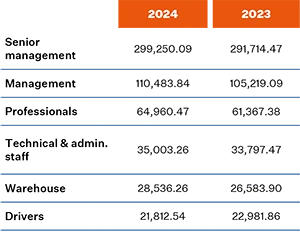
Average remuneration
by age (€)

Average pay of directors by gender (€)

Average pay of executive committee (€)

Working arrangements and work-life balance
Employee motivation and commitment are key considerations for Logista. That’s why work—life balance policies play a fundamental role in our policies. We introduced measures aimed at helping employees to better arrange their time and thereby achieve a greater balance between their personal and professional lives, with the exact measures applicable always dependent on the specific nature of each individual business and role. Examples of these measures included flexible working hours, shorter days during the summer months, Christmas, Easter and bank holiday weekends and, as well as remote working policies, the option for employees to adapt their work schedule or take a leave of absence for family reasons.
In order to ensure that the employee has adequate and effective rest, Logista approved the digital disconnection policy in 2021.
This commitment goes hand in hand with digital mentoring, which not only makes these measures possible, but also provides our team with a better work-life balance and time to disconnect from both work and the digital world.
GRI 403-1, 403-2,403-3,403-5, 403-6
Health, safety and well-being
Logista is firmly committed to ensuring the health, safety and well-being of our staff. Our aim is to create the best possible working conditions and a safe and healthy working environment. And our commitment to this is one that involves the participation of each and every Logista employee.
The human resources department’s centre of excellence set the following priorities in this area for 2024:
Reducing the accident rate
Working towards the goal of “zero accidents”. Our health, safety and well-being policy therefore continually seeks to reduce factors that could lead to accidents by setting targets for all our divisions.
The accident rate for the year was 2.20. If we compare these results with those from last year (2.49), accidents have been reduced by (12)%.
Logista is working closely with its newly acquired companies to ensure that accident rates continue to be reduced in the coming years, putting in place ambitious action plans that will be regularly monitored.
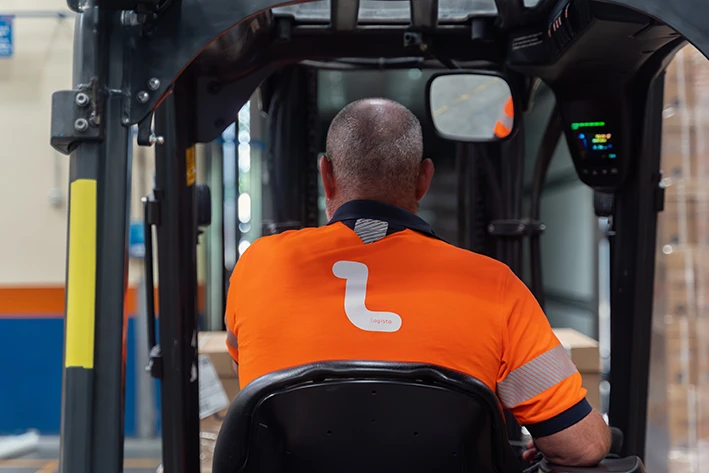
ISO 45001 certification
During 2024,Logista has continued to expand its management system for occupational health and safety, in line with the ISO 45001 international benchmark standard. We are currently certified by this standard in a number of our businesses and facilities.
Within Spain, our tobacco distribution operations (Logista, S.A.U.) have received certification, as have Logista Parcel, Logista Pharma, Nacex and Logista Freight, while at the international level, Logista Italia, Logista Portugal, Logista France, Logista Retail France, Logista Parcel, Logista Pharma, Nacex, Midsid (Portugal), and Logista Polska (Poland) are also certified. This means that 65% of the group’s employees work at ISO- certified sites. It is also worth mentioning the certification of our subsidiary, Logista Libros: although it is not a consolidated subsidiary, it is similarly guided by Logista’s focus on excellence.
In line with the guidelines established by our management systems, during this year, we have carried out 4 initial risk assessments of new facilities and 11 assessments of existing facilities. We have also conducted 49 separate studies on lighting, temperature, humidity and CO2, manual handling of loads, work equipment, visual display units, vibrations, noise and explosive atmospheres. In addition, 308 safety inspections have been carried out and 21 internal audits have been conducted. In 2023, 4 initial risk assessments were carried out for new sites, as well as 17 periodic assessments for existing sites. There were also 38 specific studies, 350 safety inspections and 18 internal audits.
In terms of management, analysis and investigation into work-related accidents, the company has analysed a total of 146 accidents that led to sick leave, 191 accidents that did not lead to sick leave, 36 workplace incidents and 59 accidents involving contracted suppliers in 2024. Last year, there were 161 accidents that involved sick leave and 193 that did not, as well as 13 incidents and 55 accidents that involved contractors.
As part of this process, we have also continued to make occupational health and safety training a priority. During 2024, a total of 8,273 training sessions or events were organised, involving a total of 4,528 employees, equating to 29,044 hours of training for each employee. During 2023, 5,966 training sessions or events were organised, involving a total of 6,578 employees, equating to 25,333 hours of training.
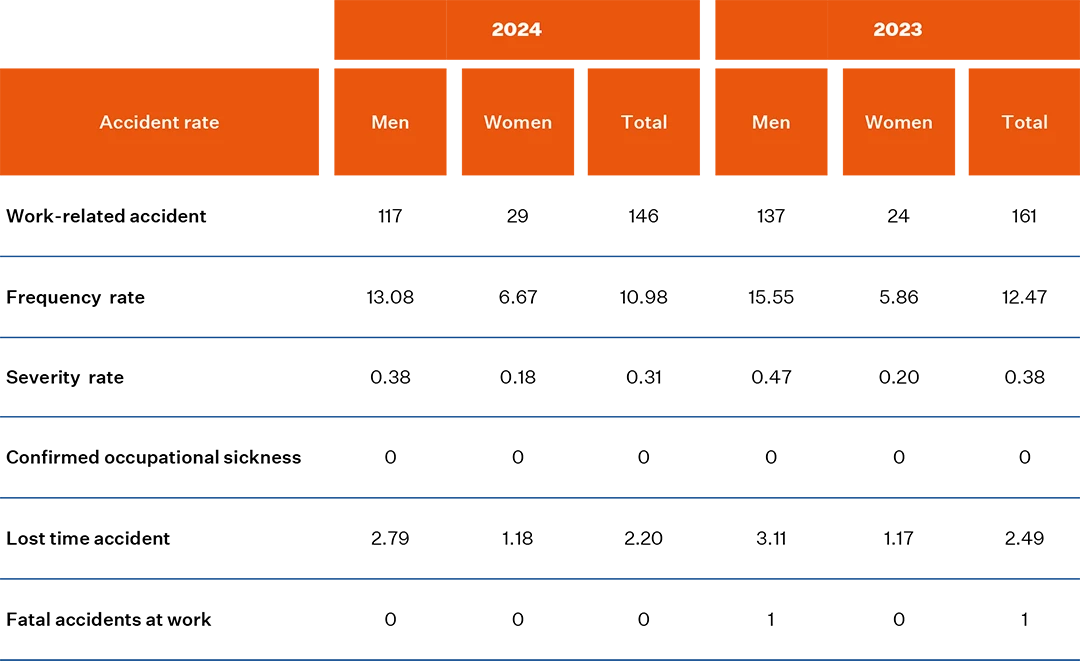
Details of the calculation formula for these indicators can be found in appendix V – Index of contents required by Law 11/2018 and GRI indicators and by Regulation EU (2020/852) – Taxonomy
Well-being in the workplace
Logista has launched a well-being in the workplace plan, targeting six key areas as a way of improving employees’ physical, emotional, nutritional, social, environmental and financial well-being. All employees can access a comprehensive healthy habits platform containing a wide range of resources, such as fitness classes (live or recorded sessions), motivational videos, challenges promoting physical activity, healthy eating guides, psychology masterclasses, mindfulness programmes, meditation classes and resources to help them manage their personal finances.
Integration of new businesses into the management system
Logista’s diversification strategy requires us to integrate new businesses into our occupational health and safety management system as quickly as possible in order to fulfil the ambitions set out in our health and safety targets.
Commitment to our employees
A number of psychosocial surveys have been carried out this year, and the climate survey for all employees has been designed and will be launched soon. Based on these inputs, Logista will continue to implement actions to strengthen the motivation and commitment of our internal talent and attractiveness in the market.
The human resources digitalisation project has been approved, through the investment in a new human capital management system that will further unite all businesses though common processes, strengthening the company’s culture throughout all geographies where the group is present. This new way of management will allow us to take advantage of the strengths of each one integrated into the same digital ecosystem.
With these new technological tools Logista will take advantage of all the information available from our teams to obtain dashboards, measuring our main indicators in real time and helping us to make more agile and predictive decisions in order to optimize our current and future competitiveness.
Social strategy

Logista is firmly committed to continuing to continuing significantly boosting its active contribution to society’s most vulnerable groups, promoting initiatives consistent with the United Nation’s 2030 Sustainable Development Goals.
For this purpose, Logista has either renewed, or worked to form new, agreements and collaborations with high-profile associations and foundations.
- The Integra Foundation, which aims to promote the inclusion in the workplace of disabled and extremely vulnerable people in Spain. We are working together on two areas:
– Developing talent through the Corporate Volunteer Programme at its School of Empowerment and as part of the Integra Tech Programme. In the first half of 2024, 253 people received a total of 100 hours of training provided by 30 volunteers. During the workshops, participants are taught pre-employment training techniques, such as how to prepare for interviews, communication techniques, personal development and how to search for jobs, allowing them to enhance their skills and channel these towards employment.
- Hiring vulnerable and disabled people to join Logista.
In recognition of our work together, we received the Integra Foundation’s 2024 Volunteer Award.
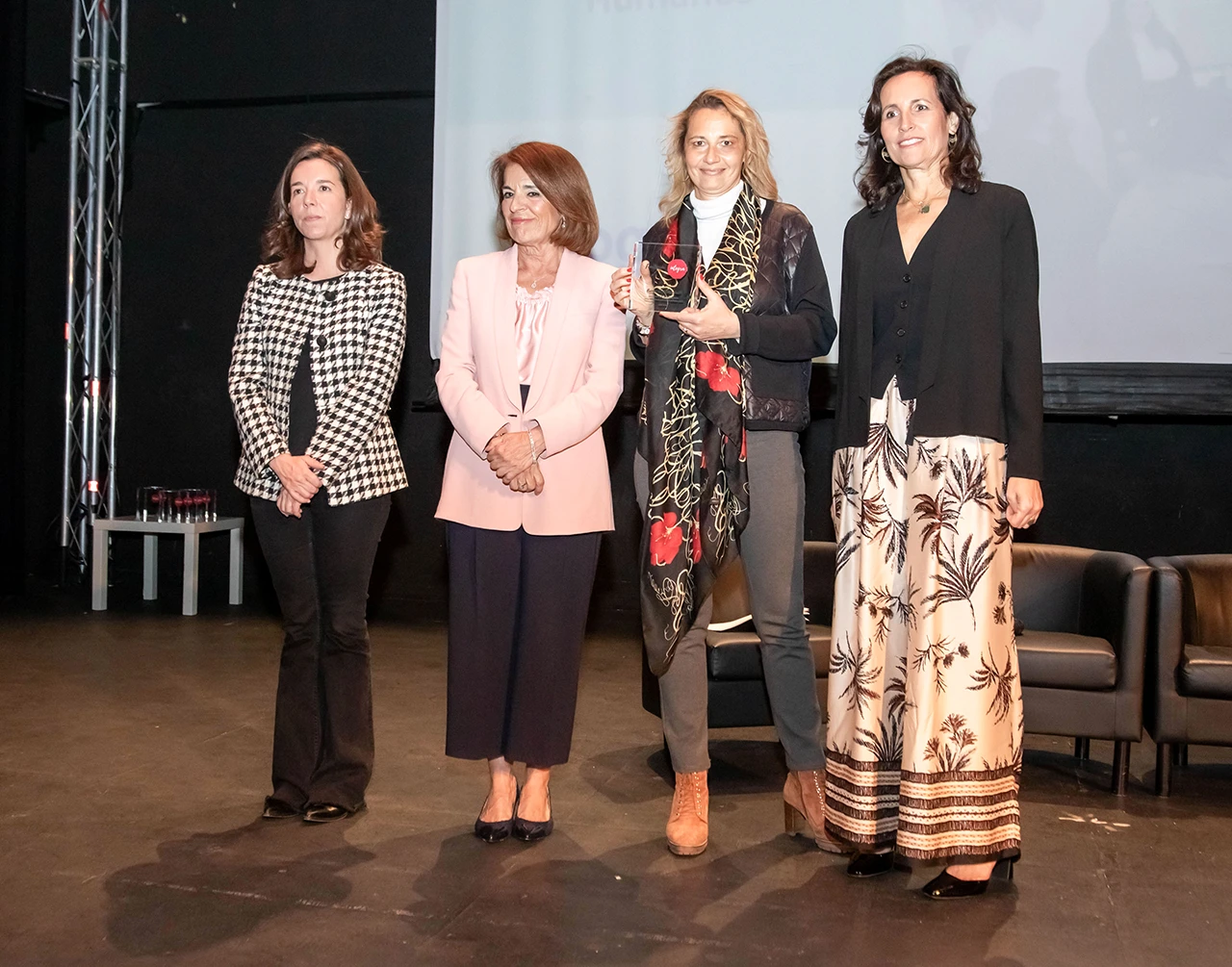

- Collaboration agreement with the Real Madrid Foundation to improve the quality of life and social integration through sports of people with disabilities at APANID’s support centre in the municipality of Getafe (part of the Community of Madrid).
- Collaboration agreement with the La Caixa Foundation on the Incorpora Programme, which aims to increase the inclusion in the workplace of vulnerable groups and disabled people in Spain.

- Collaboration agreement with the Madrid Food Bank Foundation (FBAM), as part of which more than 770 kilos of essential items were collected by Logista before being donated. This is part of Logista employees’ work to foster solidarity, the aim of which is to raise awareness of the lack of resources experienced by marginalised groups.
- Coordinating with the Save the Children Foundation to transport toys (160 toys) over Christmas and Epiphany in Spain.
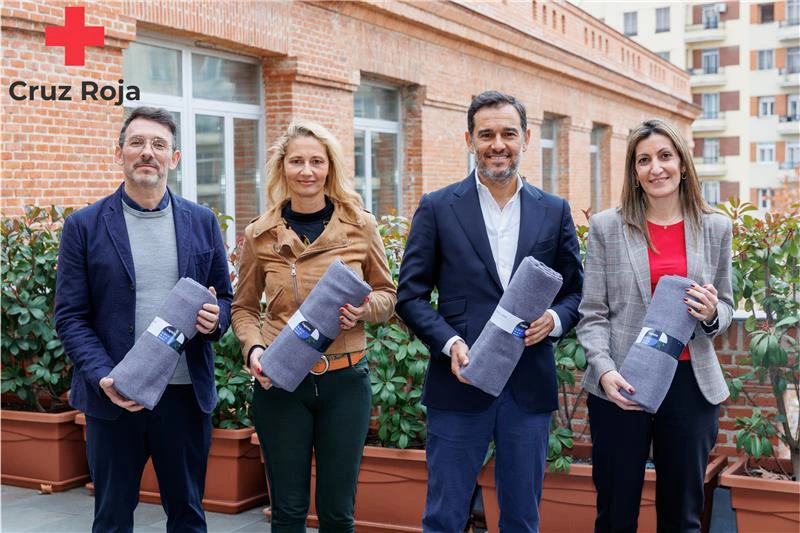
- Red Cross. Blankets made from recycled material (Logista uniforms) distributed to people in vulnerable situations. By making these blankets from its old uniforms and thus reducing textile waste, Logista is continuing to follow through on its commitment to the circular economy and social initiatives. Logista has previously worked with the startup Circoolar on social inclusion workshops to make blankets from recycled material, an initiative for which it won the 2023 Scaleups B2B Award from the Empresa y Sociedad Foundation.
- A solidarity street market was held in collaboration with Avante3, CEAR and the Prodis Foundation, organisations that work with people with disabilities and immigrants in Spain. The market increases the visibility of these groups and offers a platform for the sale of products made in their workshops.
- The Cares Foundation: cleaning and disinfection of coolers collected from hospitals, which can then be used for new deliveries that require low temperatures.
- Staff from Integra CEE are employed at our locations in Fuenlabrada and Piera to carry out packaging tasks (making up packs, building and filling displays, etc.), which is a service that we offer laboratories.
- For Rare Disease Day, NACEX was involved in the shipment of 84 charity gift packs as part of the campaign organised by the Spanish Federation of Rare Diseases (FEDER).
- Working with the Vistalegre Social Kitchen to deliver meals prepared by volunteers to the soup kitchen in Torrejón de Ardoz.
- Collaboration agreement with the Atlético de Madrid Foundation on the Adapted Football Schools project, the aim of which is to help increase the social integration of children with special needs through sports, using the ball as a therapeutic tool.
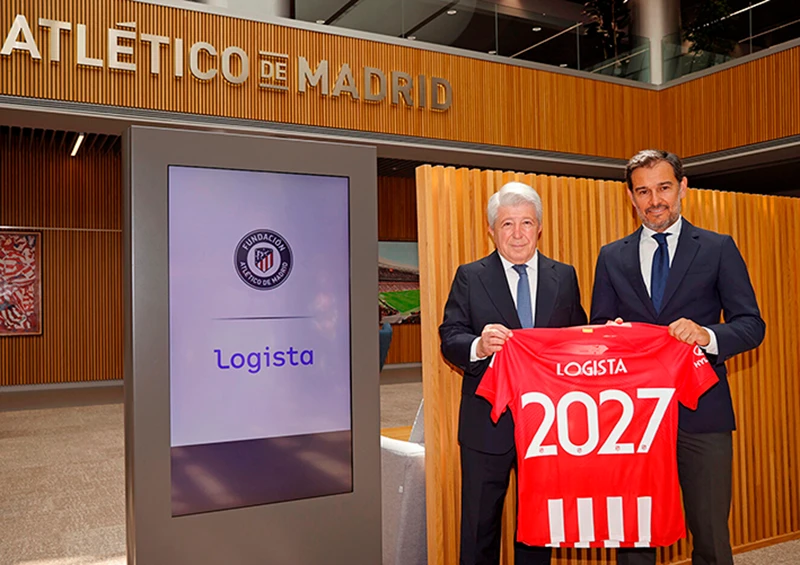
- NACEX is a Collaborating Member of the Multiple Sclerosis Foundation. It worked with them on their “An Apple for Life” campaign and at the “Mójate” event, the proceeds of which will be used to carry out research into the disease. NACEX gave one of the charity apples to each of its employees in its offices in Madrid and Barcelona. “Mójate” (Get Wet) is a campaign to raise awareness of multiple sclerosis; more than 1,500 people sign up to take part in the initiative each year, symbolically taking a leap of solidarity in the fight against multiple sclerosis.
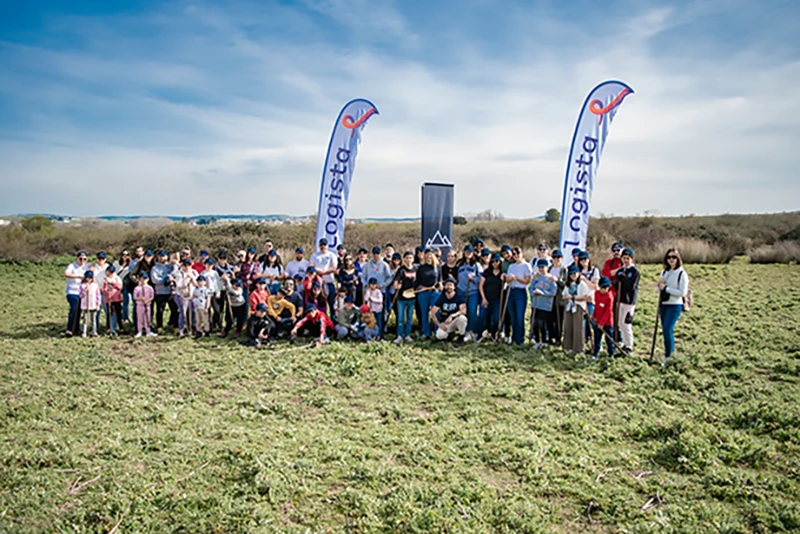
- In collaboration with the Reforest Project Foundation, 82 Logista volunteers planted one hectare of forest in the north of Madrid with 300 trees.
- Products given to social institutions through the Alcochete Town Hall Foundation in Portugal.
- Logista has collaborated in the annual gala of the Dacer Foundation, focused on technology and innovation in the field of neurorehabilitation, as well as in the design of its platform through internal volunteering.
- Christmas charity gift baskets purchased from Fundação do Gil. Fundação do Gil works to improve the welfare of children around the world, taking a pioneering attitude to the development of paediatric health and social reintegration.
- Work with Pharmaceutical Bank Portugal on their medicine pick-up at pharmacies, with the medicines being given to those who need them in Portugal.
- Working with the Gamino Foundation in France during Disability Week, raising employees’ awareness of disability through simple games.
- To promote their independence and social integration, Logista France collaborates with different foundations and associations to support vulnerable groups such as ESAT Moulins à vent, ESAT Myriade, ELISA y ESAT Vivonne, La Grange aux Bois, IME Docteur Louis Le Gaillant y Apajh. Likewise, in order to promote the interest and vocation of young people for science and technology, we have collaborated with the Savoir Apprende association. Also noteworthy is the cooperation with the Le Reseau association to improve the employability of young people and fight against school dropouts.
- Work with the Italian non-profit organization Sparta Calcio, an amateur football club in a suburban area of Rome. Local football lovers of all ages are brought together by their love of the sport to participate in a common activity with other members of their community.
- Through our work with Raggio di Luce, we have been promoting the hiring of disabled people in Italy, thus reaffirming our commitment to inclusion.
- Work with the AIPD in Nettuno, which focuses on improving the living conditions of people with Down’s syndrome in the local area of Nettuno and Anzio, not far from Rome. Community members participate in activities organised by volunteers which encourage them to socialise both with other members of the community and those outside it.
- Logista and Fundación Once have joined forces to promote the employment of people with disabilities by signing the Inserta agreement.
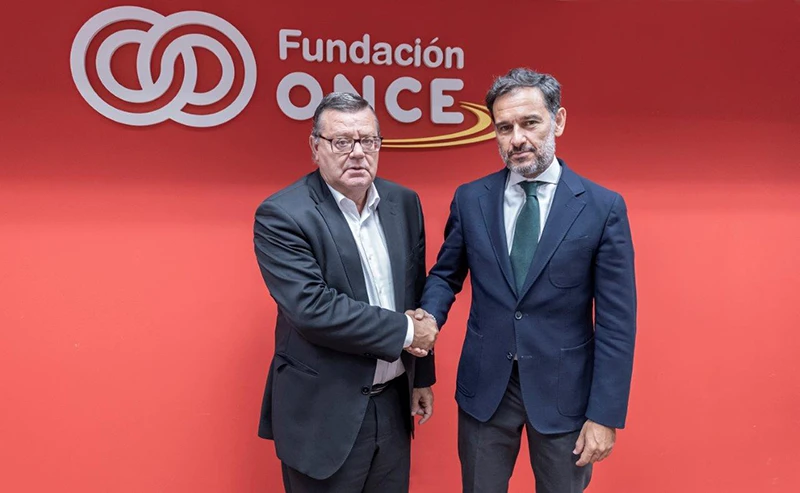
Thanks to these agreements, Logista has received the following recognitions for its social initiatives:
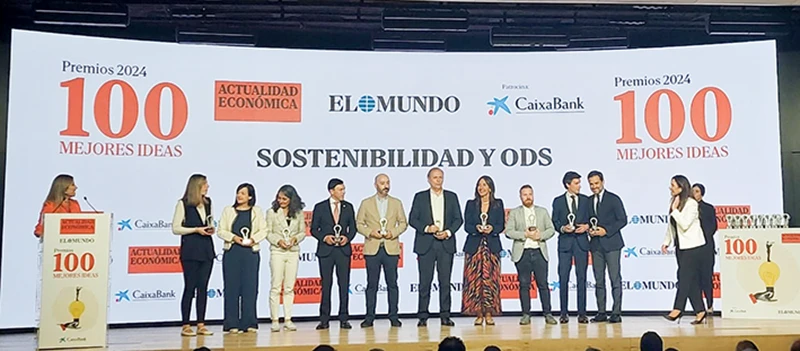
- The Actualidad Económica award for the 100 Best Ideas of the Year, in recognition of the company’s Solidarity Blankets initiative, which recycled old textile from uniforms and turned it into blankets for people in vulnerable situations.
- With the launch of Logista’s new corporate identity, we introduced new company uniforms to reflect this new image. In doing so, we also sought to increase the well-being of our employees, by using materials of the highest quality to create safer, longer-lasting clothes. The project entitled Re-Fashion “uniforms with impact” didn’t end there, as it has also had a charitable offshoot, giving a second life to our employees’ old uniforms by turning them into warm clothes for vulnerable people in coordination with the Red Cross.
- Logista received an award from the Integra Foundation for its volunteer work providing training to people at risk of social exclusion and with disabilities.
- Through the Khanimambo Foundation, we are helping to raise money for their higher education scholarship programme, Becas Xipfundo, which funds young people’s university studies or vocational training in Mozambique.
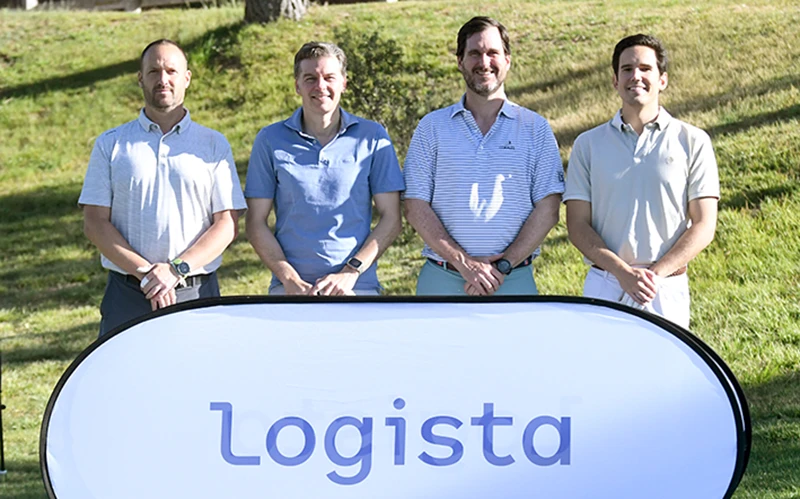

- At the third Reforest Project Awards, Logista received the “Pala de Oro” (golden spade) for its work protecting the planet after planting one hectare in the north of Madrid with 300 trees.
Logista will continue to implement strategies and policies and take part in activities that create added value to actively contribute to greater social sustainability.
GRI 2-28
Impact on the community
At Logista, we are firmly committed to long-term value creation through sustainable economic growth. We contribute through payment of more than 123 million euros in taxes to the various countries in which we operate, and we adopt environmental best practices in order to minimise the environmental impact of the work that we carry out.
We also promote long-term job creation and diversity and inclusion, as discussed earlier in this section.
In addition to our workforce, a large number of partner companies and individuals collaborate indirectly with us in our various operations and countries, for example, Nacex franchisees, Logista Parcel agents and drivers, which helps to drive local employment.
We work with a number of different foundations and non-profit associations. Contributions to foundations and non-profit organisations in 2024, amounted to €442,567, primarily to support humanitarian initiatives and social welfare and integration by helping to improve the quality of life of society’s most vulnerable groups.
We also promote internal volunteering in social actions so that our employees have the opportunity to actively contribute to promoting sustainability. In 2023, we contributed €230,374 to foundations and non-profit associations.
We also get involved through partnerships and sponsoring:
- We are a founding member of Grupo Español para el Crecimiento Verde, an organisation that works to convey its vision of a sustainable economic growth model compatible with the efficient use of natural resources to both society and government.
- We sponsor the Madrid Futuro non-profit association which was founded by businesses and public organisations looking to boost Madrid’s recovery following the health and socio-economic impact of the pandemic.
- Every year, we take part in initiatives run by CDP and other rating agencies, such as Sustainalytics and S&P.
- At sector level, we are also involved with associations such as the Mesa del Tabaco, ICIL, AESEG, AEFI, AECOC, FANDE in Spain, and such as Confindustria and Confindustria Emilia Romagna e Assoram in Italy and MEDEF de l’Est Parisien, Centre National de Formation des Buralistes, OPCO AKTO (organisme paritaire de branche du commerce de gros) and Association française des trésoriers de France, in France.
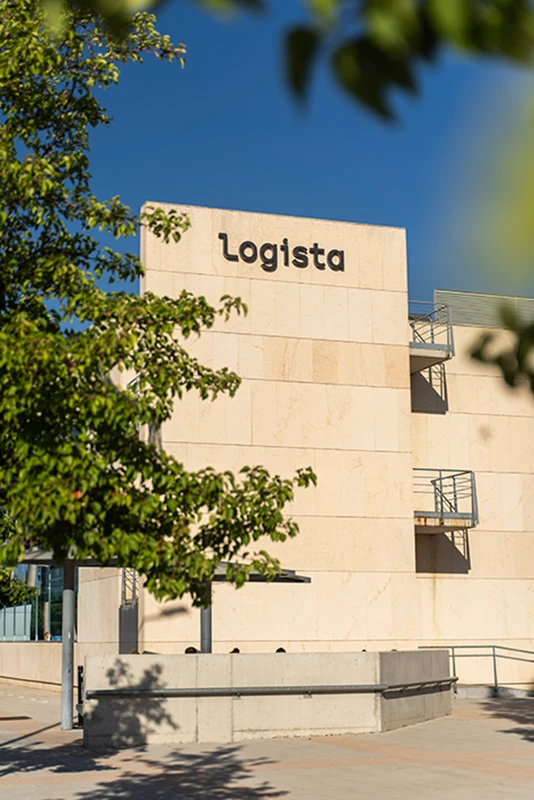
Employees by gender
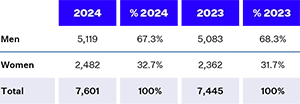
Employees by age
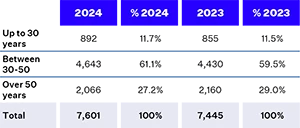
Employees by country
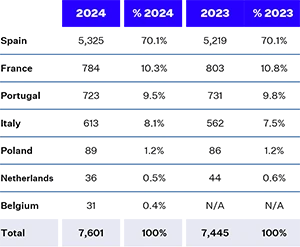
The acquisition of BPS in 2024 brings employees in Belgium. Prior to the acquisition there were no employees in that country.
In China, there are 4 employees who are not included in the country breakdown as this is not a material figure.
Employees by professional category
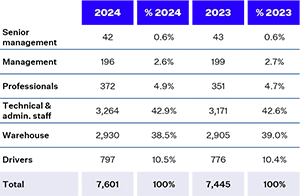
Distribution of work contract type
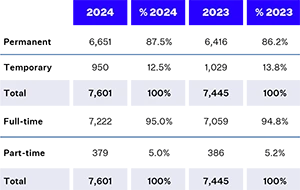
Average number of employees by gender and work contract type
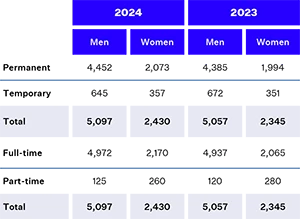
Average employees by age and work contract type

Average number of employees by professional category and work contract type
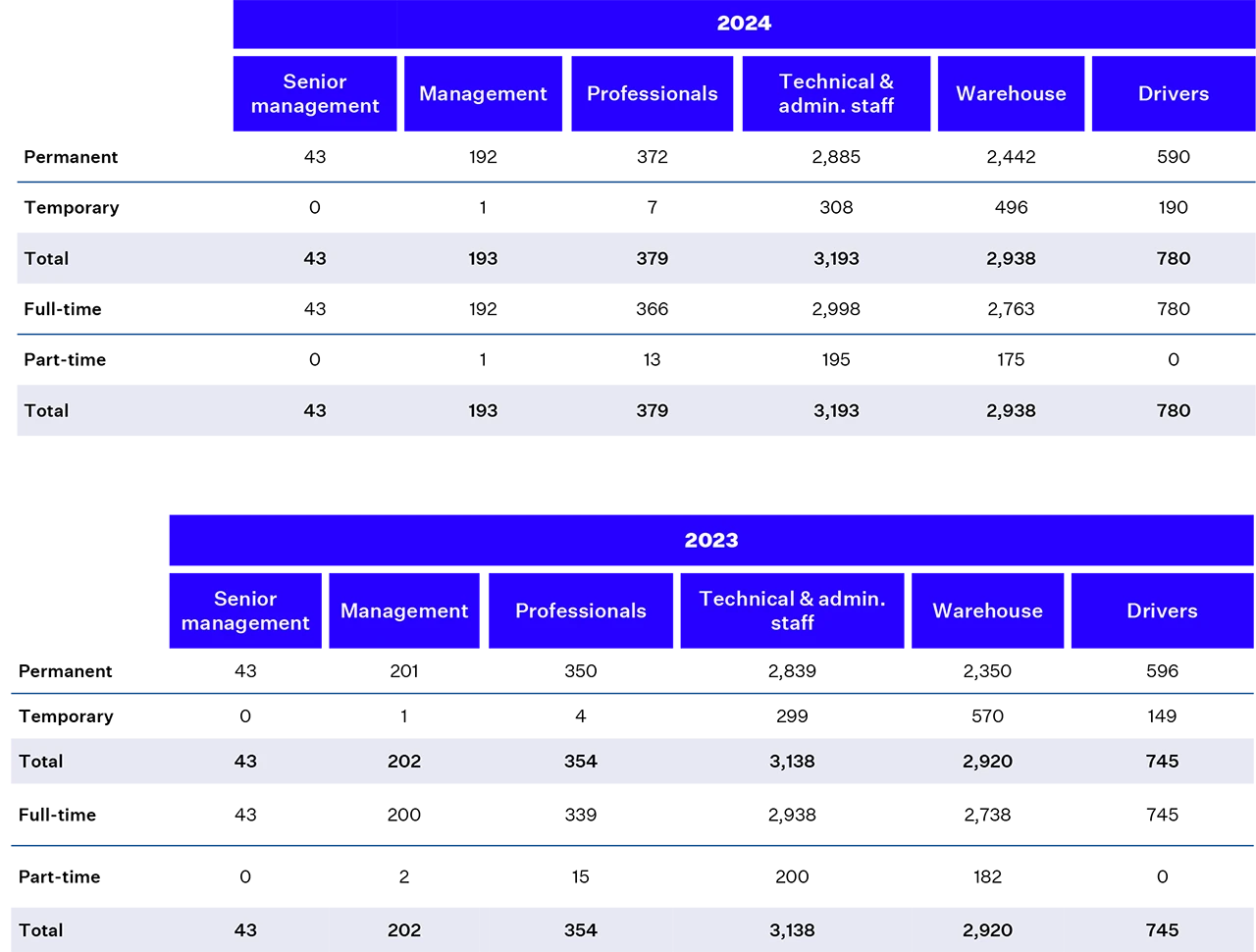
Gender-based dismissals

Annual increase as a result of internal reorganizational processes
Age Dismissals

Dismissals by professional classification
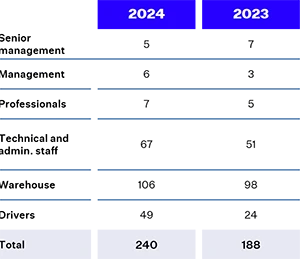
Rotation per gender

Rotation per gender includes voluntary rotation and dismissals
Voluntary rotation
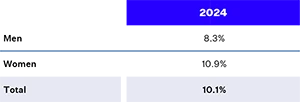

GRI 3-3
Social relationships
Logista is tasked with managing the prevention of any potential legal and reputational risks or social conflicts, so that each business can function in the best possible way both from a strategic and operational point of view. In this way, we offer a safe and enabling environment for our investors and shareholders, and primarily of course for our professionals.
The company champions best practices in terms of social and labour relations, as well as relations with trade unions, based on the principles of regulatory compliance, responsibility, transparency and due diligence. It does so by taking a cross-cutting approach in order to anticipate the possibility of any risk. Our labour relations are determined by the current regulatory frameworks in place at the international, EU and local levels, but we also work to improve the working conditions of our employees by promoting internal policies and dialogue, through collective agreements, that help create a safe and respectful working environment – and we see the principles of responsibility and transparency, cooperation and commitment as essential to this process.
This management is conducted in line with the values of the United Nations Global Compact on Human Rights, and the resolutions and recommendation of the International Labour Organization (ILO) and the European Social Charter.
99%of Logista’s employees are covered by collective bargaining agreements (99% in 2023).
We continually monitor the level of absenteeism, considering this as any absence from work due to ill health or an accident that has an impact for social security purposes. During the 2024 financial year, there were 727,000 hours of absenteeism, compared with 575,025 in the previous year. This increase is due to the incorporation of the acquisitions of the previous year. On a constant perimeter, during the 2024 financial year, there have been 610,000 hours of absenteeism, which represents a 6% increase in absenteeism hours.